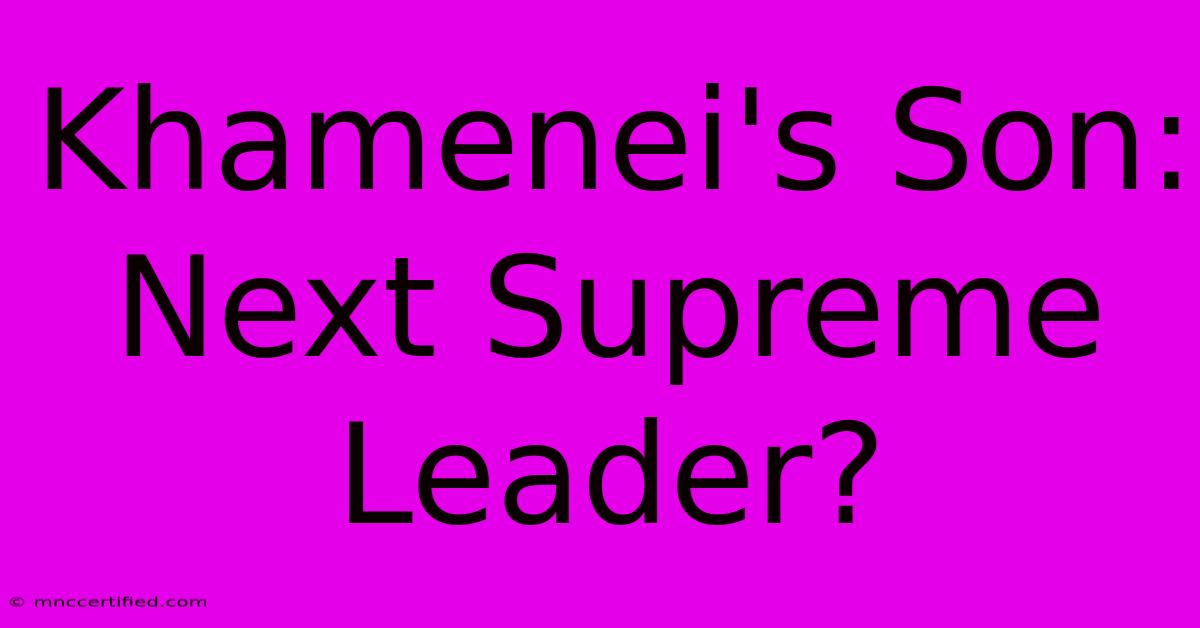Khamenei's Son: Next Supreme Leader?

Table of Contents
Khamenei's Son: Next Supreme Leader? Unpacking the Succession Speculation in Iran
The question of who will succeed Ayatollah Ali Khamenei as Supreme Leader of Iran is a subject of intense speculation, both within Iran and internationally. While no clear successor has been named, the possibility of Mojtaba Khamenei, the Supreme Leader's son, ascending to the position has fueled considerable debate and analysis. This article delves into the complexities surrounding this potential succession, examining the arguments for and against Mojtaba Khamenei inheriting his father's powerful role.
Mojtaba Khamenei: A Profile Beyond the Spotlight
Unlike his father, Mojtaba Khamenei has largely remained out of the public eye. He holds no official government position, yet his influence within certain circles of power is widely acknowledged. While his exact role and responsibilities remain unclear, he's reportedly involved in various influential religious and political institutions, fostering connections with key figures within the Iranian establishment. This behind-the-scenes involvement is a key factor contributing to the speculation surrounding his potential succession.
Limited Public Profile: A Strategic Choice or a Weakness?
His lack of a prominent public role is a double-edged sword. On one hand, it shields him from direct criticism and scrutiny, allowing him to operate relatively anonymously. On the other hand, it also limits his exposure and ability to cultivate a broad base of support necessary for such a pivotal position. This lack of public image makes gauging his true level of influence and popularity extremely difficult.
Arguments For Mojtaba Khamenei's Succession
Proponents of Mojtaba Khamenei's ascension often point to several factors:
- Familial Ties and Legacy: The most prominent argument centers on the continuation of the Khamenei legacy. This approach prioritizes maintaining stability and continuity within the Iranian political system. Appointing a family member, they argue, minimizes potential internal power struggles and ensures a smooth transition.
- Established Networks: While his role is largely hidden, Mojtaba Khamenei’s alleged connections within the Iranian Revolutionary Guard Corps (IRGC) and other powerful institutions provide a significant advantage. This existing network allows for a quicker consolidation of power, compared to an outsider.
- Clerical Lineage: Although lacking his father's religious scholarship credentials, Mojtaba Khamenei still benefits from his family's established religious lineage and connections within the clergy. This offers a degree of legitimacy within the Iranian religious hierarchy.
Arguments Against Mojtaba Khamenei's Succession
Despite the arguments in his favor, significant opposition to Mojtaba Khamenei's succession exists:
- Lack of Charisma and Public Support: Unlike his father, Mojtaba Khamenei lacks the widespread recognition and charismatic appeal necessary to unify the diverse factions within the Iranian political landscape. This lack of popular support could destabilize the government.
- Concerns about Heredity: The idea of a hereditary succession directly contradicts the principles of meritocracy and religious authority that are ostensibly foundational to the Iranian system. Such an appointment could be viewed as undemocratic and might spark internal dissent.
- Potential for Increased Factionalism: His succession could exacerbate existing factionalism within the Iranian power structure. Some factions may see his ascension as an illegitimate seizure of power, leading to increased internal conflict and instability.
The Path Forward: Uncertainty and Speculation
The ultimate decision regarding the next Supreme Leader rests within the Assembly of Experts, a body of senior clerics responsible for electing the Supreme Leader. However, predicting their choice remains challenging. While Mojtaba Khamenei's potential candidacy is a major factor in the ongoing speculation, several other prominent figures are also being considered. The situation is further complicated by the inherent secrecy and power dynamics within the Iranian political system.
Conclusion: A Waiting Game
The question of whether Mojtaba Khamenei will become the next Supreme Leader of Iran remains unanswered. While his familial ties and alleged influence provide a strong case for his candidacy, his lack of public profile, experience, and the inherent risks associated with a hereditary succession present significant challenges. The future of Iranian leadership hinges on the careful calculations and power plays within the country's complex political landscape – a scenario that will continue to generate both international and domestic intrigue.

Thank you for visiting our website wich cover about Khamenei's Son: Next Supreme Leader?. We hope the information provided has been useful to you. Feel free to contact us if you have any questions or need further assistance. See you next time and dont miss to bookmark.
Featured Posts
-
Irish Comedian Jon Kenny Passes Away
Nov 17, 2024
-
Erie Insurance Hagerstown Maryland
Nov 17, 2024
-
Mission Impossible Sequel In The Works
Nov 17, 2024
-
Denmarks Theilvig Crowned Miss Universe
Nov 17, 2024
-
Crimson Tide Rout Mercer Non Conference Schedule Ends
Nov 17, 2024